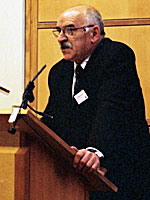Near or far, regardless of how often we meet them or talk to them, our friends remain close to us in spirit: we spent a part of our life together, big or small, and we share something which remains the basis of our mutual feelings. It is nice to know that no matter how much time has passed since the last time you met a friend, when you get back in touch things have not changed between you and her or him.
However, our existence in life is a temporary condition, and it is bound to finish. And when we lose a friend, we experience the loss of all what we have shared, of what he or she meant for us, and the feeling that there is no way back. I believe that when we mourn the loss of a friend, we are being very selfish: what we regret is mainly what we ourselves have lost. And if we have not been in touch for a while with the person we lose, the feeling of loss is by no means less intense.
 Yesterday I received the shocking news of the death of Mario Nordio (left). I had not seen Mario in maybe three or four years, but that did not matter much: he was close to my heart. Mario was a wonderful person: a bright and deep thinker, a studious of history with a broad culture, a lover of music, and a brilliant story-teller, with a great sense of humor. He could win you over just with his sardonic smile and his laughs, but he had much more to offer.
Yesterday I received the shocking news of the death of Mario Nordio (left). I had not seen Mario in maybe three or four years, but that did not matter much: he was close to my heart. Mario was a wonderful person: a bright and deep thinker, a studious of history with a broad culture, a lover of music, and a brilliant story-teller, with a great sense of humor. He could win you over just with his sardonic smile and his laughs, but he had much more to offer.During his life, Mario Nordio has been a professor of Asian history at the University of Venice, he wrote many books on middle-east history, and much more. Let me paste here a short summary of his works to remember him:
Mario Nordio was a graduate of Venice University, Oriental Languages and Literature (Hebrew) having a Semitics (Hebrew, Arabic and Neo-Aramaic, suret and ghe'ez -) and iranic background. In 1976, he was grant winner CNR - Researches National Council (Semitic philology) and appointed professor in charge of Iran and Central Asia Religious History, full Reseacher in Iranian Studies in 1982 and Associated Professor of Modern and Contemporary History of Iran and Central Asia in 1986. From 1987 to 1997 he was in charge of History of Iran since Islam to contemporary time and from 1998 he has been Professor of Asian History and Institutions. From 1996 to 1999, Professor Nordio was Chairperson of Oriental Languages and Civilisations Studies (Universita Ca' Foscari di Venezia) and from 2001 vice-chairperson of LICEM (Eurasian and Mediterranean Studies) at Ca' Foscari. He has been a member of the scientific and teaching board of Arab-Islamic Studies PhD at Ca' Foscari since 2001. He was a member of the Italian "Orient Institute", "Italian-African Institute", "Armenian Studies Association: Padus-Araxes", "Association Italia-Russia", and founder and chairperson of "Italia-Armenia Association" from 1992 to 1998. His main research field was on cultural inter-actions in political institutions. He was active in Italian and European social associations. From 1980 to 1991 he was a member of the National Council of ACLI (Christian Workers Associations of Italy). He was also active in Italian NGOs and immigration organisations. From 1994 to 1999 he co-operated with Vatican Radio Broadcasting, from 1996 with Switzerland International Broadcasting Services and from 1997 with the RAI (national radio news and cultural services), especially on the Middle East.
I regret that I have not been in touch with Mario lately, and I realize only now the mistake I made. So I am making a note to myself here today: I will make an attempt at getting back in touch with those frieds of mine whom I have not talked to in a while. That is a promise.





Comments